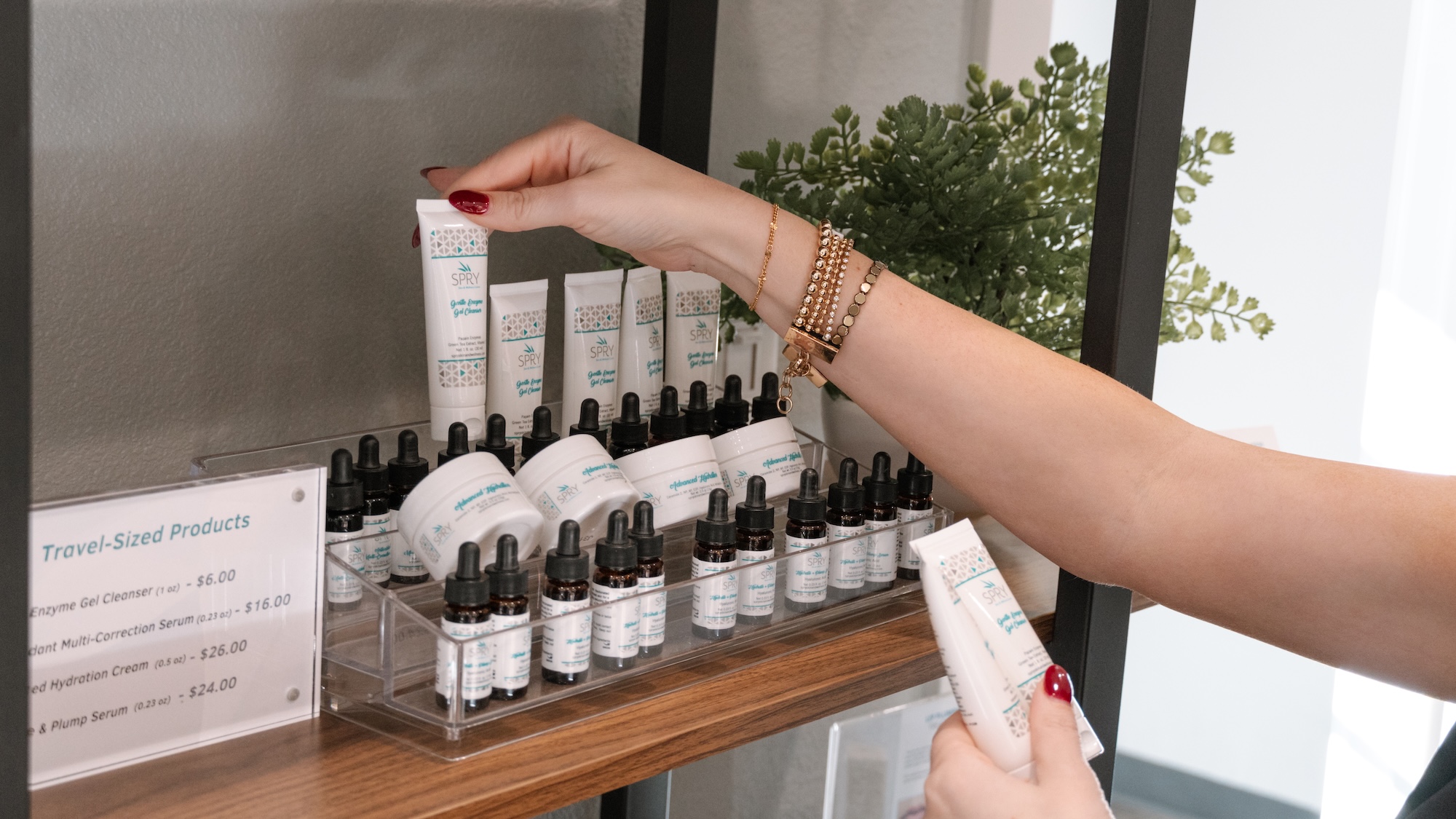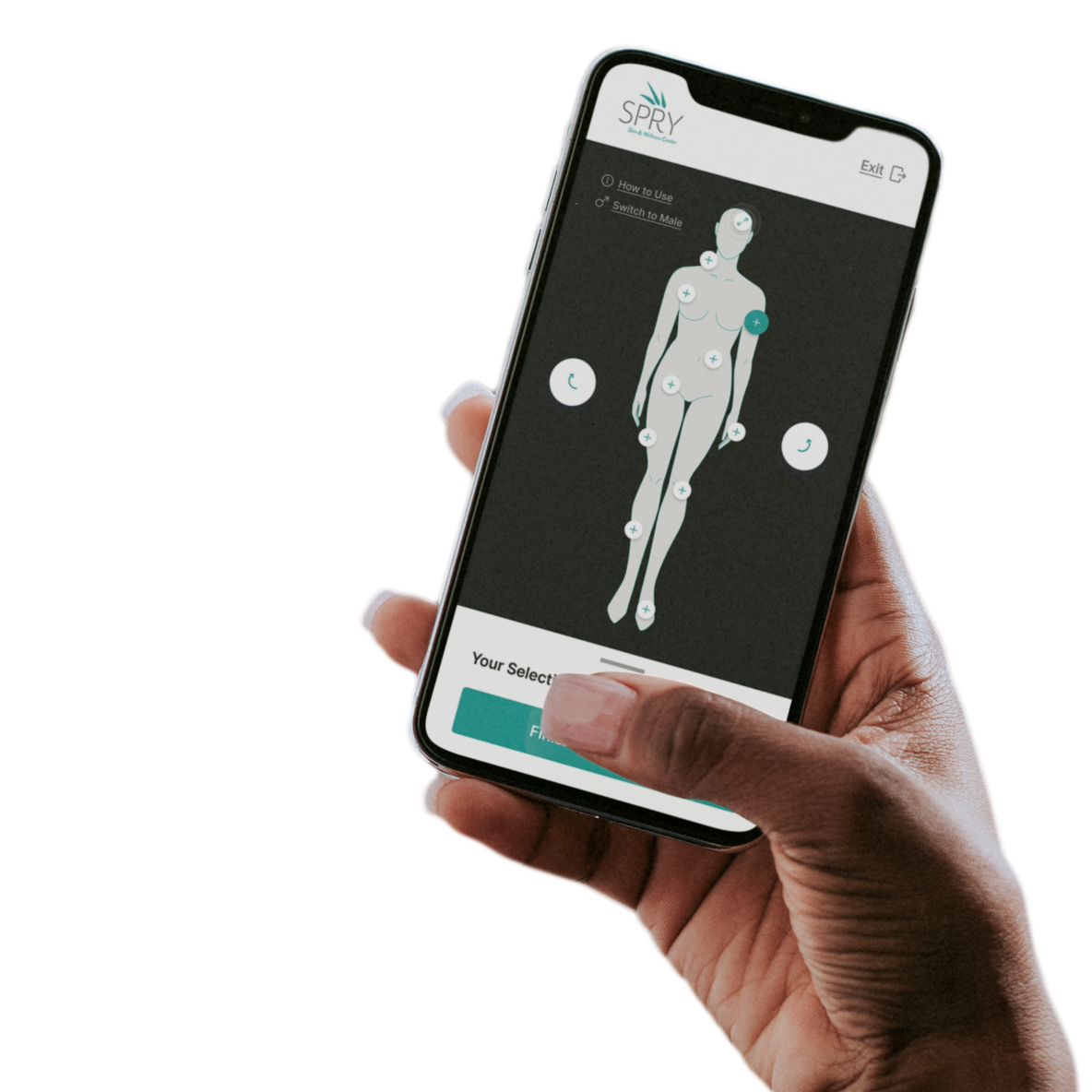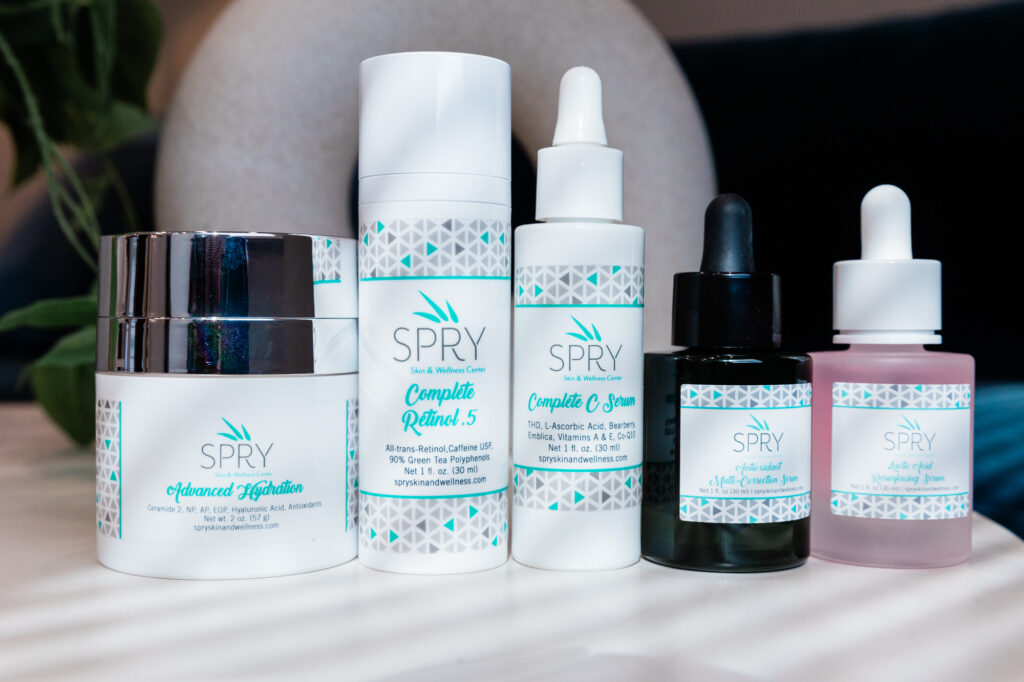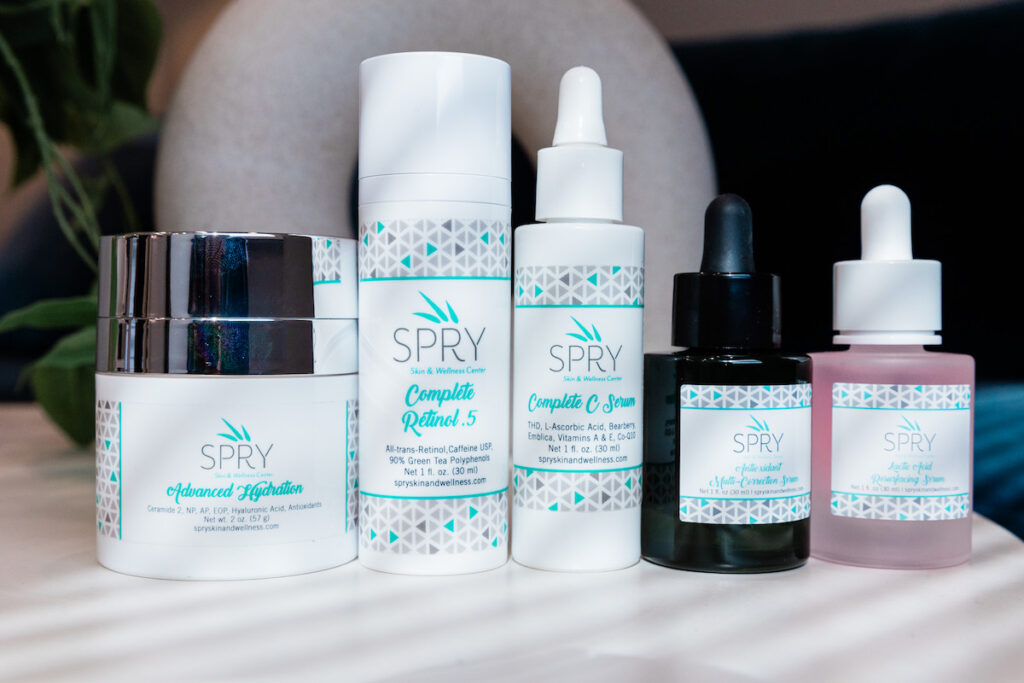
Throughout your time with our team at SPRY Skin & Wellness, we consistently emphasize the importance of using at-home skincare. This not only supports your skin’s healing process after receiving your treatments, but helps further enhance and prolong your results.
In this blog, we’ll give you a step-by-step guide on how to create your at-home routine using medical-grade skincare in Waterloo.
1) Determine Your Skin Type
Most skincare products are designed to suit specific skin types, and knowing your personal skin type helps narrow down the products that will work best. Everyone has different skin with different needs, but they all fall within 5 specific categories: oily, dry, combination, sensitive, and normal skin.
The Skin Types
These are the 5 main skin type categories and what their characteristics look like.
Oily Skin
Oily skin tends to feel consistently greasy, and often appears overly shiny. This is because the skin produces excess sebum, or oil, which over-hydrates the skin and increases the risk of developing issues like acne.
Dry Skin
When you have dry skin, your face can feel itchy, flaky, or scaly. This is because your skin produces too little sebum, causing your skin to become dehydrated.
Combination Skin
For some, they experience certain areas of their face that are oily, whereas other areas remain more dry. This is known as combination skin; typically, combination skin types are oily around the “T-zone”—encompassing the forehead, nose, mouth, and chin—and dry on the cheeks.
Sensitive Skin
Do you find that your skin easily becomes red and irritated? Or does it regularly react to certain products by burning or itching? That probably means you have sensitive skin. Sensitive skin can occur naturally as a result of genetics, or it can be caused by damage to the skin’s protective barrier.
Normal Skin
We characterize normal skin as not being reactive to most products, having minimal imperfections, and producing a healthy amount of sebum.

How to Determine Your Skin Type
The best way to determine your skin type is to meet with one of our providers for a skin assessment. They take the time to complete a thorough assessment and learn about your lifestyle. From there, they use that information to provide tailored recommendations and guidance for medical-grade skincare in Waterloo.
However, you can also gain a starting idea of your individual skin type at home. While less detailed of an assessment, the wash test can help you better understand what your skin needs and develop the right skincare regimen.
The Wash Test
When you are looking to determine your skin type, you can conduct the wash test. To do this, you’ll need to complete the following steps:
- Wash your face with a gentle cleanser and then dry it with a soft, clean towel. Do not apply any other products, including makeup.
- Wait 30 to 60 minutes, and avoid engaging in rigorous activities that could cause you to sweat.
- Check your skin in the mirror and note how it looks and feels. Follow this guide to determine what skin type you might have:
| Your Results After the Test | Your Possible Skin Type |
| My face feels oily and looks shiny. | Oily skin |
| Certain areas of my face are oily (like my nose and forehead) but the rest of my skin looks pretty normal. | Combination skin |
| I have minimal oil or flakiness, and my skin does not look inflamed or red. | Normal skin |
| My skin feels tight and is flaky. | Dry skin |
| My skin is itchy, red, and inflamed. | Sensitive skin |

2) Find the Products for Your Skin Type
Use your skin type as a starting guide to select the right skincare products for your needs.
Skincare for Oily Skin
An overproduction of sebum causes oily skin, which often leads to both teenage and adult acne, blackheads, and enlarged pores. Because your skin is oily, you will want skincare products that are listed as “oil-free” or “noncomedogenic.” These mean that the products will not clog your pores, reducing the likelihood of acne breakouts.
As for your medical-grade skincare in Waterloo, we’ll suggest products that contain salicylic acid, retinoids, glycolic acid, hyaluronic acid, and niacinamide.
These active ingredients will help exfoliate your skin, removing dried sweat, dead skin cells, and compacted sebum that clog your pores. This will help regulate sebum production to reduce acne, shrink pores, and improve the overall feel of your skin.
Skincare for Dry Skin
To soothe dry skin, you’re going to want more cream-based products, as this will help your skin stay hydrated throughout the day. While certain lifestyle changes may help balance your skin’s moisture retention, we also offer products that can help.
For your medical-grade skincare in Waterloo, you’ll need to look for ingredients that can help hydrate and moisturize your skin. These can include jojoba oil, dimethicone, glycerin, hyaluronic acid, lactic acid, lanolin, mineral oil, and shea butter.
Skincare for Combination Skin
When you have combination skin, you’ll want to incorporate a mix of products for both oily and dry skin. However, some ingredients like hyaluronic acid will be ideal to use in both your morning and evening routines.
Our skin experts will most likely recommend using certain active ingredients in the morning. This will help prep your skin for the activities of the day by regulating your natural oil production. Then, you can use more hydrating products in your evening routine to keep the dry areas of your skin moisturized throughout the night.
Skincare for Sensitive Skin
For sensitive skin, you’ll most likely want to avoid active ingredients like BHAs and AHAs. While these acids are gentle, they still may cause a reaction in your skin because they use chemical exfoliants.
When looking at what to include in your medical-grade skincare in Waterloo, you’ll want to focus on natural ingredients like aloe vera and green tea extract. Hyaluronic acid, while still an acid, is actually safe for sensitive skin because of its hydrating abilities and natural occurrence in your own skin.
There are also a few synthetic ingredients that are safe for sensitive skin, including glycerine, ceramides, and dimethicone!
Skincare for Normal Skin
If you determine that you have normal skin, then most skincare products will be safe and effective for you. However, if you have other skincare concerns like wrinkles, sun spots, scarring, rosacea, or acne (including body acne or bacne), you can incorporate products to address those concerns into your routine. Our providers can help you formulate an effective, balanced regimen.

3) Build Your Routine
Once you have identified what products you should include in your medical-grade skincare in Waterloo, you’ll need to establish the order in which you use them. Here are the basic steps you should follow for both your morning and evening skincare routines.
Cleansers
Cleansing your skin should be the first step in your routine. This helps remove dirt and debris that collected on your skin’s surface throughout the day.
To cleanse your skin, use lukewarm water and gently massage the cleanser into your pores for 30 seconds to 1 minute. When you finish doing this to your entire face, rinse with lukewarm water and dry with a soft, clean towel. Pat your skin dry instead of rubbing it.
Toners
Toners are a water-based tonic that helps remove residual impurities in the skin after cleansing. This step can also rebalance your skin’s pH, hydrate and nourish your skin, exfoliate dead skin cells, and increase product absorption.
Serums
Serums are oil-based or water-based formulas in a more concentrated form. These serums easily absorb into the skin to address common concerns, and they typically contain ingredients that address specific issues. Many active skincare ingredients, like ferulic acid, hyaluronic acid, and salicylic acid, can come in the form of serums to increase cellular turnover and deliver anti-aging benefits.
Moisturizers
There are 3 different moisturizers you can include in your medical-grade skincare in Waterloo:
- Emollients help soften, smooth, and hydrate the skin by filling in the gaps between skin cells, preventing dryness.
- Humectants attract water to the skin and bind to it, locking in moisture.
- Occlusives create a barrier over your skin and prevent water from evaporating from your epidermis, keeping it hydrated.
Some moisturizers are a mixture of all 3 types, but all of them have the same goal in mind: keeping the water in your skin!
Sunscreen
Sunscreen protects your skin from the sun’s harmful UV rays, so you should only use it at the end of your morning routine. When looking at your sunscreen options, you can choose between chemical-based and mineral-based sunscreens. While both are effective, certain factors cause people to choose one or the other.
Chemical-based sunscreens seep into your skin, absorbing the UV rays and converting them into heat. They take about 15 minutes after application to work, and last for about 2 to 3 hours. However, some people do not prefer them because the ingredients can cause breakouts, especially for those with acne-prone skin.
Meanwhile, mineral-based sunscreens use natural ingredients that are much gentler on the skin. They work immediately after application, reflecting the UV rays away from your skin. They last as long as chemical-based sunscreens, but some people do not prefer them because they may leave a white cast where applied.
No matter which sunscreen you use, we recommend applying a sunscreen that is a minimum of SPF 30. This will ensure that most of the sun’s UV rays do not damage your skin.

Build Your Perfect Skincare Routine
Discover beautiful skin by building it at home. You can easily meet with one of our skin experts at SPRY to learn what products to include in your medical-grade skincare in Waterloo. You can also use our complimentary treatment planning too to explore our available services based on your unique concerns and receive tailored recommendations from our team. We’re here for you either way!




